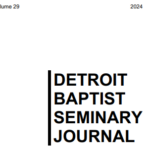When Jesus Plus Nothing Doesn’t Equal Everything
I am not a handy person. The tool chest in my basement contains only a few basic tools, many of which were given to me by my dad when I left home. Next to my tool chest is a 1995 edition of Home Depot’s very useful book Home Improvement 1–2–3, also given to me by my dad just after we bought our first house. Shortly after I received this book I decided to replace the light in our dining room with a combination ceiling fan/light: one wall switch/wire to govern two functions. I was perplexed. So I called my dad. And he asked me, “Mark, what did your Home Improvement 1–2–3 book say?” Good question. I looked it up, and viola! The book gave me a list of tools (which, thanks to my dad, I already had), several carefully illustrated steps, and a little meter that told me exactly how long it would take for a novice to complete the task.
Notice that my dad played a significant role in this little project. He gave me the tools and he gave me the book. And when I asked him for help, he told me to consult the book. And yet I would not go so far as to say that “Dad + Nothing = Everything.”
Now there are some things about which I can say “Dad + Nothing = Everything.” According to John 1:13, my natural existence is due to “decision of a man.” My surname is mine by paternal grant. But when it came to home maintenance, the “Dad + Nothing = Everything” equation is inadequate. In this case, “Everything” is the sum of “Dad + tools + a step-by-step guidebook + a telephone number + parental encouragement to personal industry.”
That’s how a lot of things work. That’s how the Christian experience works. Now if we are talking about our Christian standing and the Christian condition (justification and regeneration, respectively), then yes, Jesus + Nothing = Everything. That’s what theologians mean when they use the phrases Sola Gratia and Solus Christus. It’s the heart of the Protestant Reformation. It’s the essence of the Gospel. But when it comes to sanctification, that formula is not quite accurate. Yes, God in Christ is vitally involved in every part of the formula for sanctification, but there’s a bit more complexity involved than “Jesus + Nothing = Everything.” Note the following:
In 2 Peter 1:3 the author tells us that God has “given us everything we need for life and godliness.” He then goes on to tell us what addends one must accumulate to result in this sum total of “everything”:
- An experimental knowledge of God and of Jesus our Lord (vv. 2–3)
- The fulfilled promise of God that we become partakers of the divine nature (v. 4)
- The fulfilled promise of God that we have escaped the corruption of total inability (v. 4)
- The Scriptures (perhaps a contextual stretch, but I think vv. 19–21 are broadly part of Peter’s formula).
Peter then encourages us (“therefore”—v. 5) to use all of this equipment to add to our faith a host of virtues and disciplines (vv. 5–7). This is the essence of sanctification. And the equation looks remarkably like the equation offered above:
Everything = God + tools + a step-by-step guidebook + prayer + divine encouragement to personal industry.
Next Week: How this teaching affects the Church’s approach to the issue of Homosexuality.



I’d want to qualify your formula a bit, because what God encourages, he also fuels and enables. We have more from him than mere encouragement to personal industry. Perhaps that’s not different from what you intended to communicate, but I would definitely want to make it explicit.